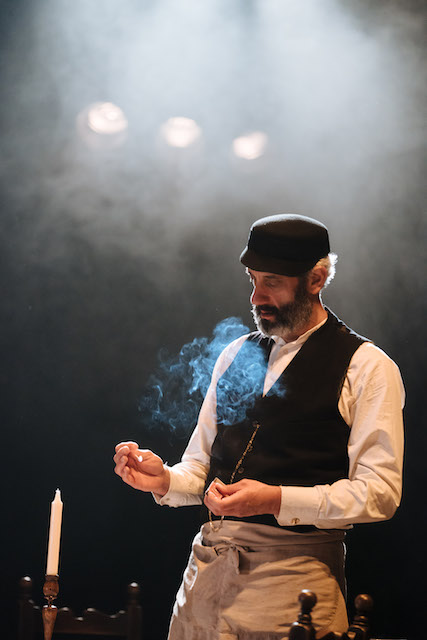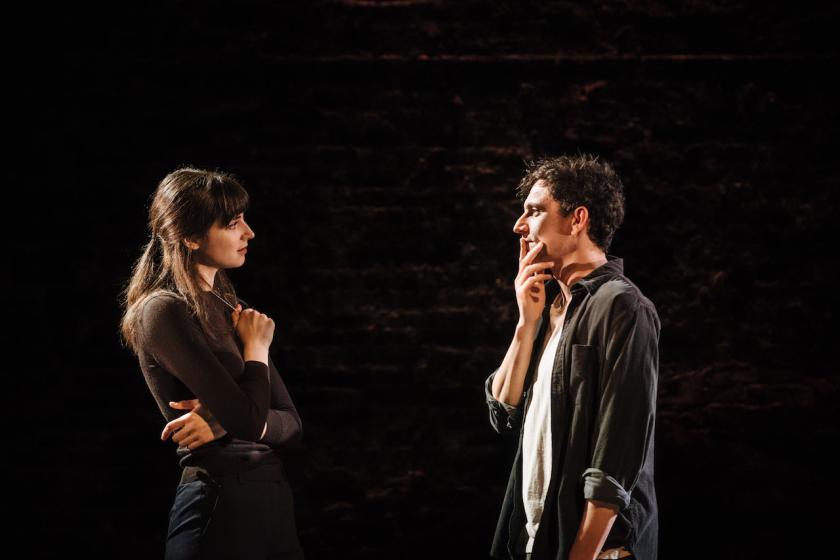This is simultaneously a love story and an archaeology of hate, a sparky, spiky encounter between two individuals whose chemistry proves as destructive as it is explosive.
Love and Other Acts of Violence opens with a comedic encounter on a dance floor – the man is a torrent of flustered polemic while she leans backwards like a faintly amused angle-poise lamp. He’s a poet and a political activist, she’s a physicist and keeps her emotions in test tubes. Yet there’s something that neither of them can explain that keeps them coming back to each other.
Cordelia Lynn’s snappy, tightly intelligent script takes a great trope of romance – what if we’d met in a former existence? – and turns it into a nightmare. The structure for the first two thirds of the play has already seen it compared to Constellations, the West End hit that deftly chronicled the doomed love between a quantum physicist and a beekeeper. Yet the subject matter evokes a rather different theatrical hit, Complicité’s Mnemonic. Like that brilliant, incisive work, it asks how traumas from former generations can flow through our veins and impact on the way we conduct ourselves in our present existence.
Love and Other Acts of Violence comes very close to being an amazing evening of theatre, yet a misjudged shift in tone towards the end robs it of crucial energy. The chemistry between Tom Mothersdale’s “Him” and Abigail Weinstock’s Jewish “Her” is tangible; on the night I saw it, a fire alarm threatened to stop play 15 minutes in and the audience’s disappointment was clear. Initially what takes place is deliberately bare of political context – Basia Bińkowska’s stripped-back set of wood and earth means that all the drama is focused on the interaction between the characters. Brexit is never mentioned – it’s not even clear that the play’s set in Britain – yet as the themes of the intolerance of outsiders and growing restrictions on civil liberties develop the dynamics become all too familiar.
 With the government’s denunciation of migrants – often through Priti Patel – more than regular in the news it perhaps shouldn’t be surprising that this is the third play I’ve watched in the last month that references the persecution of the Jews. The pogrom that Lynn’s play references, though, is not the Holocaust but the anti-Semitic atrocities perpetuated by the Poles in the city of Lemberg in 1918. This is a part of the world where the constant shifting of boundaries continually stokes nationalist sentiment; the fact that the city is now Ukrainian and called Lviv is just one indication of the tensions in its history. When both Him and Her discover that they have ancestors from the same place, the sense of doom and self-destruction intensifies.
With the government’s denunciation of migrants – often through Priti Patel – more than regular in the news it perhaps shouldn’t be surprising that this is the third play I’ve watched in the last month that references the persecution of the Jews. The pogrom that Lynn’s play references, though, is not the Holocaust but the anti-Semitic atrocities perpetuated by the Poles in the city of Lemberg in 1918. This is a part of the world where the constant shifting of boundaries continually stokes nationalist sentiment; the fact that the city is now Ukrainian and called Lviv is just one indication of the tensions in its history. When both Him and Her discover that they have ancestors from the same place, the sense of doom and self-destruction intensifies.
Lynn trained as a classical pianist, so it’s strange that what lets her play down is the catastrophic slackening of rhythm as it shifts from the present to the past (pictured above, Richard Katz as Tatte). Bińkowska’s set change is spectacular – one of many reasons why it’s worth checking out this flawed work – yet the visual change from abstract to concrete combined with the dramatic shift from polemical to discursive is a mistake. We are so invested in – and disturbed by – what’s happening between Him and Her by this point that it almost feels as if it has distorted some Aristotelian law to have other characters involved. It is only when Him reappears towards the end that the play picks up momentum once more.
Such reservations aside, it is far more interesting to witness a flawed theatrical experiment than something safe and solid, and there is plenty here for theatre lovers to relish in Elayce Ismail's production. The script never feels less than conceptually daring and repeatedly pushes you emotionally to the edge. It's a reminder too that Poland is wrestling with problems of nationalism and civil liberties that are every bit as toxic as those with which we are grappling in Brexit Britain. It leaves you hungry to see what the performers and Lynn might go on to do in the future and bodes well for a provocative new season from the Donmar.















Add comment